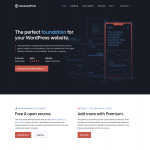WordPress is one of the most popular content management systems in the world. It has been around since 2003, and since then, it has grown to become the most widely used CMS, powering over 40% of all websites on the internet. With its ease of use, flexibility, and extensive range of plugins and themes, WordPress has made it easy for anyone to create a website or blog.
However, with the rise of low-code and no-code platforms, some people have begun to wonder if WordPress will eventually kill web development. After all, if anyone can create a website or blog with just a few clicks, why would anyone need to hire a web developer? In this article, we will explore this question and examine whether WordPress is really a threat to web development.
What is WordPress?
WordPress is a free and open-source content management system (CMS) that allows users to create and manage websites easily. It was first released in 2003 and has since become one of the most popular website building platforms in the world. As of 2021, WordPress powers over 40% of all websites on the internet.
WordPress is built on PHP and uses a MySQL database. It is designed to be user-friendly, even for those without any coding experience. With WordPress, users can create and customize their websites using a variety of themes, plugins, and widgets.
Themes are pre-designed templates that can be installed to change the appearance of a website. They control the layout, color scheme, and typography of a website. There are thousands of free and premium themes available for WordPress users.
Plugins are add-ons that can be installed to add new functionality to a website. They can be used to add features like contact forms, social media sharing buttons, and e-commerce capabilities. There are over 50,000 free plugins available in the WordPress plugin repository.
Overall, WordPress is a powerful and versatile CMS that can be used to create websites for a variety of purposes, from personal blogs to large e-commerce sites. Its popularity continues to grow, and it is unlikely that it will be replaced anytime soon.
WordPress and Web Development
WordPress is a popular content management system that has revolutionized web development by making it more accessible to people who don’t have extensive coding knowledge. It offers a range of benefits and drawbacks that web developers should consider before deciding whether to use it for their projects.
Advantages of WordPress for Web Development
One of the biggest advantages of WordPress is the wide range of themes and plugins available. This allows developers to quickly and easily add functionality to their websites without having to spend a lot of time coding everything from scratch. Additionally, premium themes and plugins can be purchased to give websites a more professional look and feel.
Another advantage of WordPress is the Divi page builder, which allows developers to create custom themes without having to write a lot of code. This makes it easier for developers to create websites that match their clients’ brand identity.
WordPress also offers a user-friendly content management system that allows clients to easily update their websites without having to rely on developers. This can save time and headaches for both clients and developers.
Disadvantages of WordPress for Web Development
One of the biggest disadvantages of WordPress is that it can be difficult to create custom themes that match clients’ brand identity. This can be especially problematic if the client has a very specific vision for their website.
Another disadvantage of WordPress is that it can be difficult to maintain. Updates to themes and plugins can sometimes cause compatibility issues, which can result in broken themes and headaches for developers.
Finally, while WordPress makes web development more accessible, it can also limit developers’ creativity. Developers who rely too heavily on themes and plugins may find that their websites lack the functionality or uniqueness that they desire.
Overall, WordPress is a powerful tool for web development that offers a range of benefits and drawbacks. Developers should carefully consider these factors before deciding whether to use it for their projects.
WordPress vs Other Web Development Platforms
When it comes to choosing a web development platform, WordPress is often compared to other popular options such as Wix, Webflow, and Squarespace. Here’s how they stack up against each other:
WordPress vs Wix
Wix is a popular website builder that offers drag-and-drop functionality for users to create websites quickly and easily. However, when it comes to customization and flexibility, WordPress has the upper hand. WordPress offers a variety of themes and plugins that allow users to create a fully customized website tailored to their specific needs. Wix, on the other hand, has limited options for customization and may not be suitable for more complex websites.
WordPress vs Webflow
Webflow is a web design and development platform that allows users to create responsive websites without coding. While Webflow offers a user-friendly interface and a variety of templates, it may not be suitable for more complex websites. WordPress offers more flexibility and customization options and is a better choice for websites that require more advanced functionality.
WordPress vs Squarespace
Squarespace is a website builder that offers a variety of templates and drag-and-drop functionality. While Squarespace is a good option for simple websites, it may not be suitable for more complex websites that require more advanced functionality. WordPress offers more flexibility and customization options and is a better choice for websites that require advanced functionality.
In terms of competition, all of these platforms are vying for a share of the web development market. While each platform has its strengths and weaknesses, WordPress remains the most popular choice for web development due to its flexibility, customization options, and large developer community.
When it comes to quality, each platform has its own strengths and weaknesses. It’s important to evaluate each platform based on your specific needs and requirements to determine which one is the best fit for your project.
The Future of WordPress in Web Development
WordPress has been a major player in the world of web development for almost two decades now. While some have questioned whether WordPress is a dying platform, the truth is that it is still growing and evolving to meet the needs of professional web developers and small businesses alike.
One of the biggest advantages of WordPress is its ease of use. With its intuitive interface and vast library of plugins and themes, even those with little to no coding experience can create professional-looking websites. This has opened up a whole new world of opportunities for those looking to get into web development.
At the same time, WordPress is also becoming more powerful and flexible, allowing professional web developers to create even more complex and sophisticated websites. This means that there is still plenty of room for growth and innovation in the world of WordPress web development.
Of course, as with any technology, there are always potential challenges and threats to consider. However, as long as WordPress continues to adapt and evolve with the changing needs of the growing web design and development industry, it is likely to remain a popular and valuable tool for both developers and potential customers.
The Role of AI in WordPress and Web Development
Artificial Intelligence (AI) is a game-changer in many industries, and web development is no exception. WordPress, being the most popular content management system (CMS) in the world, has embraced AI to make web development easier and more efficient.
AI in WordPress has enabled developers to create websites with minimal coding and design skills. AI-powered tools like Wix ADI, Hostinger, and Jimdo can build websites by analyzing user preferences and generating designs based on them. This technology has made it possible for non-technical users to build websites without relying on developers.
AI in WordPress has also enabled developers to create more personalized websites. With AI-powered tools, developers can analyze user behavior and preferences to create websites that are tailored to individual users. This technology has made it possible for businesses to create websites that provide a better user experience, leading to increased customer satisfaction and loyalty.
Another way AI is changing web development in WordPress is through chatbots. Chatbots are AI-powered tools that can communicate with users in a conversational manner. They can help users find information, make purchases, and even book appointments. Chatbots have become increasingly popular in WordPress websites, as they can provide 24/7 customer support without the need for human intervention.
In conclusion, AI is playing an increasingly important role in WordPress and web development. It has made it possible for non-technical users to build websites, created more personalized websites, and enabled businesses to provide better customer support. As AI technology continues to evolve, we can expect to see even more innovative ways in which it can be used in WordPress and web development.
The Importance of HTML and CSS in WordPress and Web Development
HTML (Hypertext Markup Language) and CSS (Cascading Style Sheets) are two of the most important technologies for creating websites. They are the foundation of web development and are essential for creating visually appealing and functional websites. WordPress, one of the most popular content management systems (CMS) used by web designers and developers, relies heavily on HTML and CSS.
WordPress is built using PHP, but it relies on HTML and CSS to display content in the browser. HTML provides the structure of the website, while CSS provides the style and layout. WordPress themes are built using HTML and CSS, and they can be customized using these technologies. Web designers and developers can create custom WordPress themes by modifying the HTML and CSS code.
HTML and CSS are also important for creating responsive websites. Responsive web design is the practice of designing websites that adapt to different screen sizes. This is achieved using CSS media queries, which allow web designers and developers to apply different styles based on the screen size. HTML is also important for creating accessible websites. Web designers and developers need to use semantic HTML to ensure that websites are accessible to users with disabilities.
Web designers and developers need to have a good understanding of HTML and CSS to create effective websites. They need to know how to use HTML tags, attributes, and elements to structure content and how to use CSS to style and layout content. They also need to know how to optimize HTML and CSS for performance. Bloated HTML and CSS can slow down websites, which can negatively impact user experience and search engine rankings.
In conclusion, HTML and CSS are essential for WordPress and web development. They are the foundation of web design and development and are used to create visually appealing and functional websites. Web designers and developers need to have a good understanding of HTML and CSS to create effective websites.
Conclusion
In conclusion, WordPress is not killing web development, but rather enhancing it. With its vast array of themes and plugins, it has made web development more accessible to people with minimal coding knowledge. WordPress has also created new opportunities for web designers and developers to create custom themes and build brand identity for small businesses and potential customers.
The Divi page builder, for example, has made it easier for web designers to create professional-looking websites without the headaches of coding. Premium themes have also made it possible for small businesses to have high-quality websites without breaking the bank.
While WordPress may not be the best choice for every project, it is a powerful content management system that can handle everything from e-commerce websites to simple blogs. Its regular updates ensure that it stays up-to-date with new technologies and AI, making it a reliable choice for web designers and developers.
Competition from platforms like Wix, Webflow, and Squarespace has only pushed WordPress to improve its functionality and quality. While it may not be as simple to set up as these platforms, WordPress offers more flexibility and customization options.
In the end, whether or not WordPress is dying is irrelevant. The growing web design and development industry continues to offer new opportunities for professional web developers and designers. With WordPress as a tool, they can continue to create high-quality websites that meet the needs of their clients.






